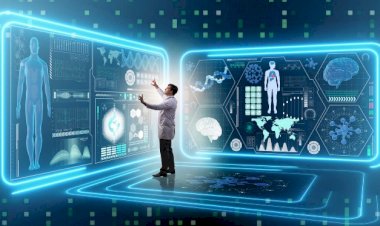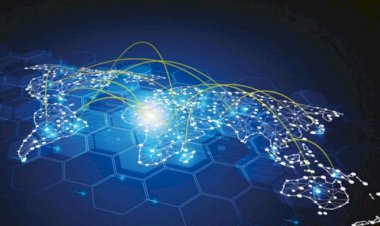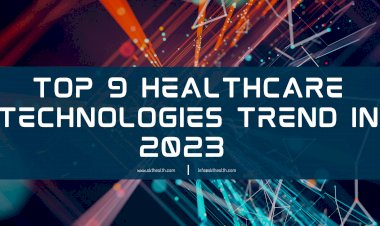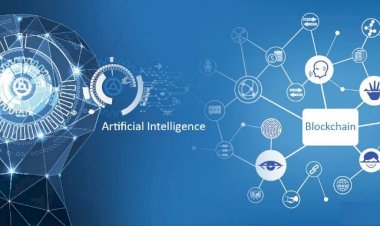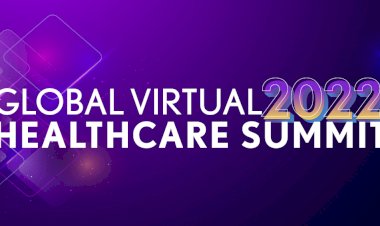Combo Tech Pack for Great Healthcare Systems
Blockchain as a technology for various use cases like Healthcare, Supply chain, Mobile apps, Real estate and finance. Technology became Driving forces in the world of innovation.
Blockchain as a technology for various use cases like Healthcare, Supply chain, Mobile apps, Real estate and finance. Technology became Driving forces in the world of innovation. Blockchain has inherent feature that adds strong security layer and make transparent process for any application it used in. And on the way it has become one of the moved loved technology by entrepreneurs and their users.
On businesses sort of similar impression also made by Artificial Intelligence in the world of business. From AI innovation, the power of chatbot has revamped the traditional businesses and taken customer experience far ahead. AI itself born as core part of every Business — be it finance, travel, retail, healthcare, or real estate.
Combined both blockchain and AI have set the foundation of a new era of business in one way or the other. But have we ever wondered what will happen when the two technologies will converge? Will their coexistence fit into the industry world? Would there be a chance of improved economy and efficiency?
In Detail Introduction of AI and Blockchain:
Artificial Intelligence is the technology that makes machine smart enough to mimic human intelligence and perform tasks on their own. The technology with its impressive features, has bought a paradigm shift in the business world — making everyone understand why investing in artificial intelligence is the need of the hour.
Key Features:
· Better Data Management
· Personalization
· Future prediction
· Error reduction
· Real-time assistance
· Data mining
Expecting to be continue making a major impact on the business market by this technology as shown by the following analysis –
1. By 2025 the global market of Artificial intelligence going to be worth of $190 Billion.
2. AI will take 40% digital transformation on its hand by end of 2019.
3. AI-enabled voice assistances will hit more than 4 billion devices across the globe by this year.
4. Companies relying on AI data will take $1.2 trillion a year from non-insight driven firms by the year 2020.
Blockchain in layman language, is a distributed ledger that stores all the transactions in nodes in transparent and secure manner. The technology, with its exciting characteristics, has disrupted the business world in numerous ways and made everyone interested in going through the digestible guide to Blockchain app development.
Key features:
1. Immutability
2. Decentralized Database
3. Distributed ledger
4. Transparency
5. Data protection.
This technology also has demonstrated wider applicable scope as depicted from the statistics –
· According to IDC, $11.7B will be spent on Blockchain by the year 2022, with a compounding annual growth of 73.2%.
· 69% of banks across the globe are experimenting, and around 90% of North American banks and European banks are investing in Blockchain development to make their process seamless, secure and transparent.
· Banks and finance firms are predicted to save around $8–12B annual by embracing blockchain.
The trifecta factor: AI, Big data and Blockchain
Big data prepares the ground for the advancement of both AI and Blockchain. It empowers businesses and app developers to accumulate a heap of data into structured components.
This data is further empowered by AI-powered machines and applications to understand the user behaviour and deliver personalised customer experience. Whereas blockchain relies on big data to get the analysed data that can be stored in its distributed ledger and made accessible to people, depending on if it is on a public or private network.
With this, we have taken a quick recap of the basics of the disruptive technologies, let’s directly go to how they complement each other — beginning with impact of AI on blockchain industry.
Role of AI in the blockchain system:
· Better data management
· Improved energy consumption
· More scalability
· Higher security
· New data gates
Better data management: Currently, Blockchain relies on hashing algorithms for data mining. These algorithms work with the verification process is found. This complicates the whole process and demands higher efforts.
Artificial intelligence can give an escape from this approach by providing a more intelligence which makes the data management process seamless.
Improved energy consumption: By improving the data mining system, Artificial Intelligence for Blockchain can help with streamlining the whole process. This will eventually help in cutting down the number of efforts and time invested in mining the data in the Blockchain sphere.
More scalability: As the Blockchain scaling problem explained by Cointelegraph, the size of Blockchain is growing at a substantial pace of 1MB for every 10 minutes — with existing data be somewhere around 85MB. But, there’s no effective method currently in practice to deal with data optimization and elimination process.
Artificial Intelligence, in this scenario, can help by introducing an advanced decentralized learning system or a new data sharding technique that makes the system more efficient and open new ways for Entrepreneurs to look into Blockchain for startups and Enterprises
Enhanced Efficiency: The speed and effectiveness of performing a P2P transaction in a Blockchain system costs around $600 million a year. And one of the reasons behind is that each node executes the same task on its own copy of data so as to be the first one to come up with a solution.
AI can improve this situation by providing an intelligent system that looks into which node is going to deliver the solution at the earliest and informing other nodes to shut down their efforts. This will eventually cut down the cost involved as well as upgrade the efficiency of the whole system
Higher security: Though blockchain is known for its unbeatable security characteristics, the application designed using the technology are not so secure. This is another sphere where AI can prove to be a requisite addition.
Artificial intelligence can integrate natural language processing, image recognition, and multi-dimensional real-time data transformation capabilities into blockchain peer-to-peer linking. This avails data miners with an option to turn a large-scale system into several micro-economy environments and optimize data transactions in a secure and effective manner. Above all, it adds flexibility to the process with the help of machine learning intelligence.
New data gates: New data gates: In the coming years all the data will be stored on a blockchain and the organizations will tend to directly buy them from the data holders. Suppose case like this, AI going to help by providing an intelligent method of tracking data usage, grating access, and other such tasks. They will act as data gates from where the whole blockchain data flow will be maintained.
Applied AI considers the use of cognitive technologies to acquire, structure and deliver health records into research and enterprise-grade data sets, which has helped break down the illiquidity that has made data challenging to share in the health care industry. Computer vision is used in coordination with natural language processing to convert the millions of records and notes that transit in the form of images into electronic documents; these electronic records are then worked on with a variety of ontologies to disambiguate the information they contain to reach a high level of accuracy and eventually reach a point of structured digital record.
The workforce reviewing the digitization of these records is guided through the review rather than required to manually recapture the data contained. It makes adjustments to the information that was incorrectly transcribed by the system, which systematically feeds a machine learning feedback loop to continuously train the system with manual intervention for greater accuracy.
However, I believe applying AI to extract and structure information held in electronic medical records is only a first step. Where AI offers value in the near future is in interaction with a health care blockchain, where the benefits of distributed records can be combined in sophisticated and powerful ways with cognitive technologies to target the democratization of health insights
While health information accessible by AI via blockchain promises to accelerate a generation of health care insights, there are also worthwhile counter-narratives to consider regarding our privacy of data.
Health information is personal. The health data we generate reflects who we are at our genetic levels, the care we are receiving and the outcomes our care is providing. Although it might be useful for corporations and universities to have that information available into its most distributed format on the blockchain, the transparency blockchain offers, along with the sheer size of medical records, might make it an impossible solution. Yet, with the right model, I believe there is no reason to think that we cannot utilize the broader medical learning potential in the data we are generating in health care, so long as we are not storing the records on the blockchain directly, but rather using blockchain as a mechanism by which we offer access and authorization for medical records.
I believe AI models are hungry for semi-structured data sets; they can uncover patterns hidden to the naked eye and create meaning in the linkage of thousands of disparate entities. A permissible distribution of health information via blockchain could make available for the first time in history a wide array of executable data sets for these highly specialized, trusted, narrow AI agents, with the ultimate goal not just of aggregating and analysing data, but of bettering the care delivered to patients everywhere.

 Meghana
Meghana 









